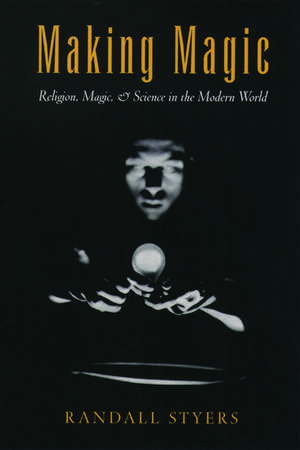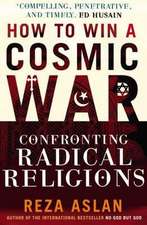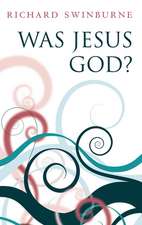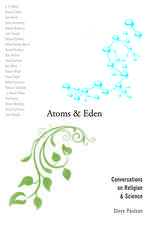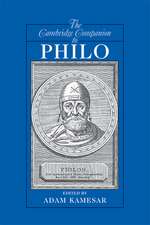Making Magic: Religion, Magic, and Science in the Modern World: AAR Reflection and Theory in the Study of Religion
Autor Randall Styersen Limba Engleză Paperback – 10 iun 2004
Din seria AAR Reflection and Theory in the Study of Religion
-
 Preț: 254.97 lei
Preț: 254.97 lei - 18%
 Preț: 582.53 lei
Preț: 582.53 lei - 13%
 Preț: 188.31 lei
Preț: 188.31 lei - 14%
 Preț: 170.95 lei
Preț: 170.95 lei - 27%
 Preț: 489.17 lei
Preț: 489.17 lei -
 Preț: 227.70 lei
Preț: 227.70 lei - 30%
 Preț: 521.01 lei
Preț: 521.01 lei -
 Preț: 464.36 lei
Preț: 464.36 lei -
 Preț: 497.18 lei
Preț: 497.18 lei - 39%
 Preț: 216.87 lei
Preț: 216.87 lei - 35%
 Preț: 198.22 lei
Preț: 198.22 lei - 30%
 Preț: 534.65 lei
Preț: 534.65 lei - 30%
 Preț: 586.78 lei
Preț: 586.78 lei - 25%
 Preț: 643.57 lei
Preț: 643.57 lei - 30%
 Preț: 574.09 lei
Preț: 574.09 lei - 27%
 Preț: 359.59 lei
Preț: 359.59 lei - 14%
 Preț: 171.93 lei
Preț: 171.93 lei - 13%
 Preț: 123.96 lei
Preț: 123.96 lei - 9%
 Preț: 305.11 lei
Preț: 305.11 lei - 9%
 Preț: 121.57 lei
Preț: 121.57 lei - 14%
 Preț: 112.72 lei
Preț: 112.72 lei - 19%
 Preț: 342.54 lei
Preț: 342.54 lei - 30%
 Preț: 598.02 lei
Preț: 598.02 lei - 28%
 Preț: 443.61 lei
Preț: 443.61 lei - 10%
 Preț: 250.03 lei
Preț: 250.03 lei - 18%
 Preț: 346.70 lei
Preț: 346.70 lei - 28%
 Preț: 449.51 lei
Preț: 449.51 lei - 30%
 Preț: 579.68 lei
Preț: 579.68 lei - 30%
 Preț: 628.64 lei
Preț: 628.64 lei - 30%
 Preț: 582.93 lei
Preț: 582.93 lei -
 Preț: 353.47 lei
Preț: 353.47 lei - 8%
 Preț: 298.74 lei
Preț: 298.74 lei - 15%
 Preț: 275.45 lei
Preț: 275.45 lei - 30%
 Preț: 579.27 lei
Preț: 579.27 lei - 25%
 Preț: 627.09 lei
Preț: 627.09 lei
Preț: 289.76 lei
Nou
Puncte Express: 435
Preț estimativ în valută:
55.44€ • 57.89$ • 45.89£
55.44€ • 57.89$ • 45.89£
Carte tipărită la comandă
Livrare economică 24-31 martie
Preluare comenzi: 021 569.72.76
Specificații
ISBN-13: 9780195169416
ISBN-10: 0195169417
Pagini: 304
Dimensiuni: 152 x 230 x 1 mm
Greutate: 0.45 kg
Editura: Oxford University Press
Colecția OUP USA
Seria AAR Reflection and Theory in the Study of Religion
Locul publicării:New York, United States
ISBN-10: 0195169417
Pagini: 304
Dimensiuni: 152 x 230 x 1 mm
Greutate: 0.45 kg
Editura: Oxford University Press
Colecția OUP USA
Seria AAR Reflection and Theory in the Study of Religion
Locul publicării:New York, United States
Recenzii
Magic has always been a marginal, umbrageous subject. Despite numerous attempts, no philosopher, scientific observer, or cultural theoretician has managed to describe its essential nature or to circumscribe its proper boundaries-and no wonder. The virtue of Randall Styers compelling study is not that it finally succeeds in defining magic with clarity-an impossible and patently misguided objective. Instead, through a meticulous and incisive examination of the major and minor writers on the subject, Styers shows that the highly pliable, always shifty, devious, and problematic category of magic has been an extremely effective device with which to define and to empower that which it is not: religion proper, (real) science, rationality, modernity. The result, then, is far from marginal.
